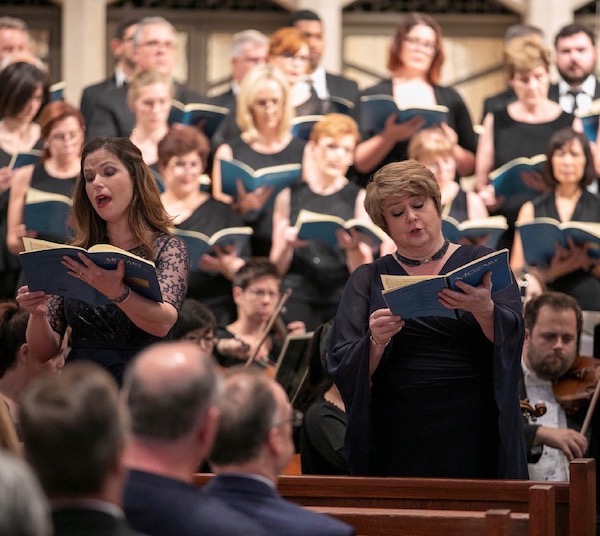A dark and stormy finale to Apollo Orchestra season with Mozart’s Requiem

Colleen Daly (left) and Elizabeth Bishop were soloists in the Apollo Orchestra’s performance of Mozart’s Requiem on Sunday. Photo: Bruce Boyajian
The Apollo Orchestra ended its season Sunday afternoon with a bold program combining the familiar and the rare. The draw for the large crowd, filling every pew of Bethesda’s Church of the Little Flower, was Mozart’s setting of the Requiem Mass. As part of the bargain they also heard pieces by Peter Maxwell Davies, Hector Berlioz, and Ralph Vaughan Williams, all in a concert that cost the audience nothing.
Elizabeth Bishop’s most recent appearance with Washington National Opera was her scene-stealing Marcellina in The Marriage of Figaro in 2016. The American mezzo-soprano’s buttery-toned voice proved well-suited to the plangent melody of “D’amour l’ardente flamme” from Berlioz’s La Damnation de Faust. Led capably by assistant conductor Jeffry Newberger, the orchestra set the scene for the longing soliloquy of pining Marguerite, particularly in vivid solos for English horn.
Barry Banks had to withdraw from his last scheduled appearance with Apollo and Bishop in 2017. Returning in fine voice, the English tenor brought a lyrical tone and sensitive phrasing to the Vaughan Williams song cycle On Wenlock Edge. His airy sound and cushioned legato captured the nostalgic quality of the poetry of A. E. Housman, matched with forthright high notes as in the musings of the dead friend in “Is My Team Plowing?”
Music director Stephen Czarkowski kept the balances even in the large orchestration, completed by the composer almost two decades after the original chamber version. The misty effects of “Bredon Hill” shimmered with celesta and glockenspiel, although the delicate string chords were not always perfectly tuned in the final song.
Czarkowski emphasized brash tempos and full-voiced choral sound more than subtlety in a rousing rendition of the Mozart Requiem. A large chorus combining singers from the Little Flower Choir and the Heights Choral Society consisted of one row of men to three rows of women. They kept pace with the conductor’s demands in speed and volume, with some struggles by the sopranos in the high range and a lack of clarity in the melismatic passages of the “Kyrie.”
Bishop and Banks anchored a fine quartet of vocal soloists, which produced a balanced, well-mixed sound in the “Recordare” movement. Bishop’s warm, maternal singing in the “Benedictus” was a highlight of the piece. Baritone Trevor Scheunemann thundered appropriately in the “Tuba mirum” section of the sequence, matched by a resonant trombone solo. Soprano Colleen Daly had a clean, transparent sound in her solos, especially a radiant “Lux Aeterna,” although she was occasionally thin of tone at the top of the quartet.
After taking the opening “Introit” at a brisk trot, Czarkowski ramped up the intensity in the opening section of the “Dies Irae,” his tempo (and gestures) so insistent that the orchestra faltered at times in ensemble unity. For the most part, though, his forces answered with loud and crisply articulated sounds, as in the large choral chords at the start of the “Rex tremendae.” In the midst of this description of the terrors of the Last Judgment, a violent storm tore through the region, pelting the church with noisy hail and wind.
There were also shortcomings, in the iffy intonation of the strings in parts of the “Recordare” and “Hostias” movements as well as a shaky choral start in the “Confutatis.” Chorus and soloists got ahead of Czarkowski’s beat a bit in the Offertory, and the “Osanna” fugues were plodding and labored.
A late arrival because of accident-related traffic delays meant missing the concert’s opening work, the high-spirited An Orkney Wedding by Peter Maxwell Davies.


